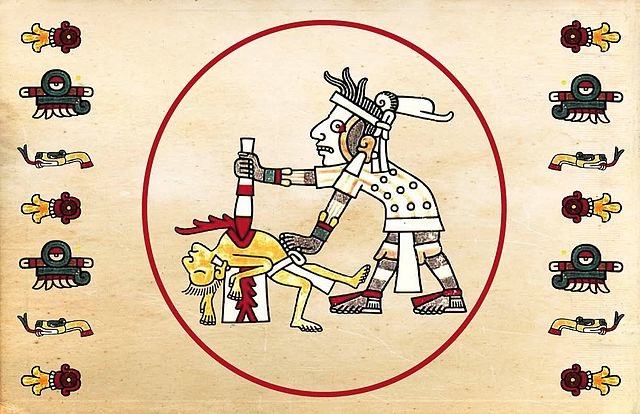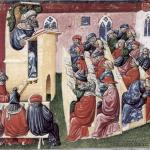
Atheist and anti-theist Bob Seidensticker runs the influential Cross Examined blog. He asked me there, on 8-11-18: “I’ve got 1000+ posts here attacking your worldview. You just going to let that stand? Or could you present a helpful new perspective that I’ve ignored on one or two of those posts?” He also made a general statement on 6-22-17: “In this blog, I’ve responded to many Christian arguments . . . Christians’ arguments are easy to refute.” He added in the combox: “If I’ve misunderstood the Christian position or Christian arguments, point that out. Show me where I’ve mischaracterized them.” I’m always one to oblige people’s wishes, so I decided to do a series of posts in reply.
It’s also been said, “be careful what you wish for.” If Bob responds to this post, and makes me aware of it, his reply will be added to the end along with my counter-reply. If you don’t see that at the end, rest assured that he either hasn’t replied, or didn’t inform me that he did. Bob’s words will be in blue. To find these posts, word-search “Seidensticker” on my atheist page or in my sidebar search (near the top).
*****
Bob’s hyper-absurd, clueless view on this topic is expressed in his post, “God Loves the Smell of Burning Flesh: Human Sacrifice in the Bible” (7-29-14):
The Abraham and Isaac story in Genesis 22 is often given to show God’s rejection of human sacrifice and, as it is in the Bible today, that may well have been the purpose. But, like a cheerful fairy tale that comes from a darker original, the Isaac story may not initially have had its happy ending.
He reiterated his position with his usual mockery of God, on 8-18-14:
God . . . likes the occasional human sacrifice, which puts him in conflict with Commandment #6 prohibiting murder. Can’t this guy follow his own rules?
Whenever an atheist disagrees with any Bible passage (and/or doctrine), there is always the “textual change!” canard: ready and available to be utilized at the drop of a hat. So good ol’ Bob (always eminently fair to the Bible and Christianity, and scrupulously objective and scholarly at all times) does so. This story was supposedly changed. One of three very stupid, extraordinarily weak arguments he gives for concluding this is that Genesis 22:19 at the end of the story states: “’Then Abraham returned to his servants.’ Alone.”
For Bob, because Isaac wasn’t mentioned in this passage, it proves that he wasn’t there at all, and was therefore, sacrificed. The folks who went and changed the passage to make it a nice fairy tale ending apparently missed this obvious fact of “logic”: thus leaving clues for clever biblical exegetes [cough] like Bob to have an “a-ha!!” moment and unravel the conspiracy, lo, these three thousand plus years later.
To show the laughable silliness of such an argument, compare it to a biblical scene involving David and Saul, in 1 Samuel chapter 26. Saul had been trying to kill young David. David (accompanied by Abi’shai: 26:6-9) had a chance to kill him, and didn’t (26:5-12), because he was the king and “the Lord’s anointed” (26:9, 23). Saul, of course, was surrounded by “three thousand men” (26:2), and it is said that “the army was encamped around him” (26:5), that he was “sleeping within the encampment” (26:7), and that he was with “the army” (26:14) when David talked to him from the mountaintop (26:13-17). The story then concludes with: “So David went his way, and Saul returned to his place” (26:25).
According to Bob’s “logic”, both Abi’shai and Saul’s 3000-man army must both have disappeared in the time between verse 25 and 26, because after all, 26:25 only mentions David and Saul and no one else! Somehow Saul dispatched all those men so he could return alone. Can anyone defy such compelling logic? This is what passes for “atheist exegesis.” It’s only the 46,209,173rd time I have observed such shoddy pseudo-“reasoning” and “Bible interpretation” from atheists, who claim to be so much better at it than us poor, miserable, dumb Christians. Maybe on the 46,209,174th attempt, they will actually get something right.
But doesn’t the Bible reject human sacrifice?
Just in case anyone was unclear that the Old Testament comes from a post-Bronze Age Mesopotamian culture, it tells us 37 times that God loves the pleasing aroma of burning flesh.
Yes: of animals: sacrificed according to Mosaic Law (and if not, He is not pleased by it: Jer 6:20). Why mention that in a sub-section supposedly about human sacrifice? Perhaps it’s because for a atheist like Bob, a rare animal species should be protected, while we slaughter human children in the womb (which he thinks is quite acceptable) by the hundreds of millions. This would appear to place animals on a higher level of value than human beings; therefore, he objects to any animal sacrifice in the Bible (and I assume he must also be a vegetarian, in all consistency). This is not mere speculation. Bob makes it clear:
Your life is more valuable than the life of a slug or a rat, but would it be more valuable than the last breeding pair of bald eagles? What’s more valuable—the life of a random stranger you will never meet or your beloved pet?
Bob stumbles upon and notes the true biblical teaching on child sacrifice (even an unplugged clock is right twice a day!):
Deuteronomy 18:10, “Let no one be found among you who sacrifices their son or daughter in the fire.”
Human sacrifice in the Bible
The Bible acknowledges that sacrificing humans is powerful mojo, because that’s how the Moabite god Chemosh beat Israel’s god Yahweh (2 Kings 3:27). The combined forces of Israel, Judah, and Edom were about to defeat Moab when the Moabite king sacrificed his son to Chemosh. The result: “There was an outburst of divine anger against Israel, so they broke off the attack and returned to their homeland.” (More here.)
Nice try. There is nothing whatsoever in the text about some supposed defeat of God (Yahweh)by a false Moabite god. That’s simply Bob’s cynical eisegesis. Nor is it proof that God turned against Israel / Judah simply because the word “wrath” (RSV) is present (KJV: “indignation”). Bob assumes that too. The Hebrew is qetseph, which is usually used of God’s wrath, but not always, and not necessarily. For example, Esther 1:18 (RSV): “This very day the ladies of Persia and Media who have heard of the queen’s behavior will be telling it to all the king’s princes, and there will be contempt and wrath in plenty” (cf. Ecclesiastes 5:17). It can also be plausibly interpreted as the wrath of the king of Moab against Israel. The Bible refers (RSV) to “a king’s wrath” twice (Proverbs 16:14; 19:12).
The translation of 2 Kings 3:27 that Bob uses is the NET Bible: a relatively obscure translation. It’s very unusual (perhaps even singular) in that it inserts “divine” into the passage, making it definitively a case of God’s wrath against Israel. But I can’t find any other translation that does this. No one need merely take my word on this. They can consult the online pages with multiple translations of the passage (one / two) just as I did.
God’s prohibition of child sacrifice as an outrageous abomination is very clear. I found 18 passages concerning this in my paper, The Bible’s Teaching on Abortion. Jesus compared the ancient sacrifice of children to hell itself (particularly, child sacrifice to Ba’al or Molech). But Bob is quite capable of blowing that off, as of no relevance:
Though the Bible talks a good story as it rejects human sacrifice, it’s a sock puppet, and you can make the Bible say just about whatever you want.
Oh, I agree with that! It won’t make any sense, and is devoid of logic and reason (e.g., Bob’s analysis here and as seen throughout my many critiques of his anti-Christian bilge), but folks can and often do try to make the Bible say stuff that it doesn’t teach.
If you think God can’t say precisely the opposite of what he commanded before, then you underestimate an omnipotent god! Take a look:
Consecrate to me every firstborn male. The first offspring of every womb among the Israelites belongs to me, whether human or animal. (Exodus 13:2)
But nothing that a person owns and devotes to the Lord—whether a human being or an animal or family land—may be sold or redeemed; everything so devoted is most holy to the Lord. No person devoted to destruction may be ransomed; they are to be put to death. (Leviticus 27:28–9)
As for Exodus 13:2, “consecration” is a different concept from sacrifice. The animals could be sacrificed, but not human beings. It simply means “set aside” or “dedicate” a person or thing for the Lord’s use, as can be seen in the many biblical usages of it. What Bob thinks he has proven here is anyone’s guess. A “person devoted to destruction” is a murderer, and they received the death penalty under Mosaic Law. I don’t see anything here that “proves” that God condoned child sacrifice. Does anyone else?
Undaunted, Bob moves to his final charge:
As if bragging to his drinking buddies, God laughs about it afterwards. To teach the stiff-necked Israelites who’s boss, God said,
So I gave them other statutes that were not good and laws through which they could not live; I defiled them through their gifts—the sacrifice of every firstborn—that I might fill them with horror so they would know that I am Jehovah (Ezekiel 20:25–6).
. . . sacrificing children to gods? Looks like there was a lot of that going around, and not just among the bad guys.
This is a particular sort of “judgmental, sarcastic divine” language that I dealt with in my earlier installment, “Seidensticker Folly #3: Falsehoods About God & Free Will.” The sense here is similar to that of the following passage, four chapters earlier:
Ezekiel 16:19-22 (RSV) Also my bread which I gave you — I fed you with fine flour and oil and honey — you set before them for a pleasing odor, says the Lord GOD. [20] And you took your sons and your daughters, whom you had borne to me, and these you sacrificed to them to be devoured. Were your harlotries so small a matter [21] that you slaughtered my children and delivered them up as an offering by fire to them? [22] And in all your abominations and your harlotries you did not remember the days of your youth, when you were naked and bare, weltering in your blood.
I’m sure the following commentary will very likely be above Bob’s comprehension and his skeptical bigoted anti-theist-dominated cognitive powers, but I offer it anyway, primarily for the sake of Christians: to better understand this passage, this sort of somewhat complex Hebrew / biblical genre and thinking, and to be able to counter absurd claims about it, such as what Bob offers:
26. I polluted them—not directly; “but I judicially gave them up to pollute themselves.” A just retribution for their “polluting My sabbaths” (Eze 20:24). This Eze 20:26 is explanatory of Eze 20:25. Their own sin I made their punishment.
caused to pass through the fire—Fairbairn translates, “In their presenting (literally, ‘the causing to pass over’) all their first-born,” namely, to the Lord; referring to the command (Ex 13:12, Margin, where the very same expression is used). The lustration of children by passing through the fire was a later abomination (Eze 20:31). The evil here spoken of was the admixture of heathenish practices with Jehovah’s worship, which made Him regard all as “polluted.” Here, “to the Lord” is omitted purposely, to imply, “They kept up the outward service indeed, but I did not own it as done unto Me, since it was mingled with such pollutions.” But English Version is supported by the similar phraseology in Eze 20:31, see on [1052]Eze 20:31. They made all their children pass through the fire; but he names the first-born, in aggravation of their guilt; that is, “I had willed that the first-born should be redeemed as being Mine, but they imposed on themselves the cruel rites of offering them to Molech” (De 18:10).
might know … the Lord—that they may be compelled to know Me as a powerful Judge, since they were unwilling to know Me as a gracious Father.
*
Polluted them; either I permitted them to pollute themselves, or discovered that they had polluted themselves, or treated them with loathing and abhorrence, as polluted persons.
In their own gifts; either in their gifts which they pretended to bring to me, or rather in their sacrifices they offered to whom, or at least in what manner, they, not I, had chosen; or, which is most likely, gifts are here their first-born, which are more than other children accounted gifts.
Through the fire: see Ezekiel 16:20,21. Most insufferable affront to God, to see those children inhumanly offered to the devil, which, in remembrance of his redeeming the fathers, were consecrated to God! Exodus 13:2; and possibly this was first done when they offered to Baalpeor, Numbers 25:3.
It’s just common sense. If the Bible clearly says something — asserts it (“child sacrifice is an abomination”) 20+ times –, then we can be assured that this is biblical teaching, and (as we believe) what God wants to convey in His inspired revelation to mankind. Even Bob freely concedes that the Bible mostly teaches this. But then he goes on to assert that it is self-contradictory and that the Bible is “a sock puppet, and you can make the Bible say just about whatever you want.”
Christians approach the matter very differently. If we run across one passage that appears at first glance to contradict 20+ that say the opposite of what the one seems to say, we don’t immediately throw out all the others. That would be stupid. We assume that there is likely an explanation for why one appears to differ from the other 20+ (that we have something to study and learn). What I have explained is the plausible explanation: it’s a particular non-literal genre or expression that is seen in other places in the Bible as well.
Bob (throughout his “biblical” critiques) utterly ignores genre, style, cultural and linguistic aspects (and most relevant cross-referencing, too), so for him it’s simple: God loves child sacrifice because (so he wrongly thinks), we have this one passage supporting that assumption. He falsely accuses God, while personally advocating the glories and wonders of legal abortion. He’s the one (not God) who believes in the child sacrifice that he casually assumes in this paper to be a great evil. Thus, he is a liar, blasphemer, and hypocrite to boot.
Moreover, even if a Christian couldn’t understand this one passage and synthesize it with the others, we still have the well-known principle of biblical hermeneutics: interpret the difficult, “hard” or complex passages that are not readily or easily understood, by other clearer passages on the same topic.
It’s really only the same approach that a scholar would afford any literature. Say, for example, that we were studying the thought of Descartes or Plato, and find ten passages in one or the other clearly stating x, but also one that states apparent direct contradiction y. The scholar will go with what he knows, rather than with what he has not yet explained. He either concedes ignorance, or assumes that an explanation will eventually be found, or that the thinker may have changed his mind at some point. In any event, the strong evidence for x is not overcome by the exceptional evidence of y.
It’s the same in science as well. Just about every theory or hypothesis has to deal with anomalies that don’t fit into it. It doesn’t make the scientist throw out the theory because it was not absolutely sufficient to explain every jot and tittle.
The same applies to biblical interpretation. But I have suggested a plausible solution. I’m not saying that no one can figure out or explain in another fashion what Bob casually assumes to be a biblical contradiction. I don’t think this “problem” is anywhere near impossible to resolve.
***
Photo credit: Aztec human sacrifice (16th century codex) [public domain / Wikimedia Commons]
***













